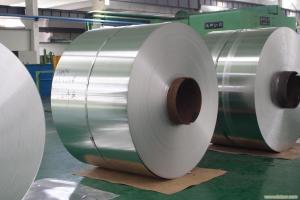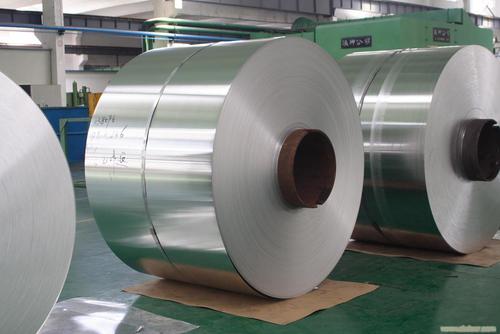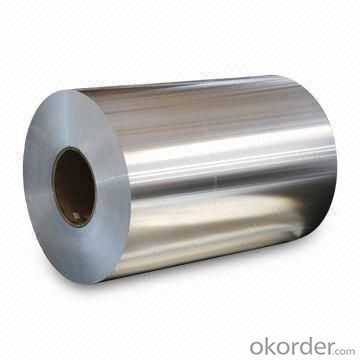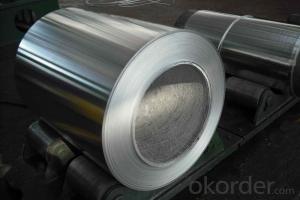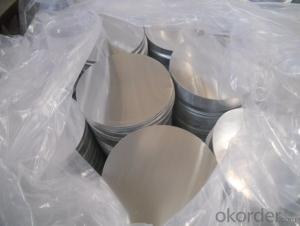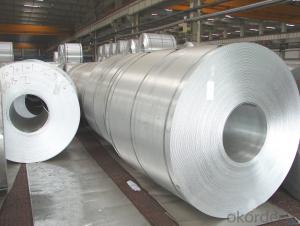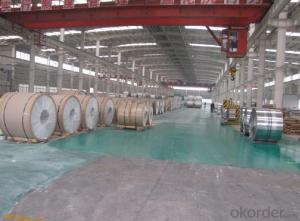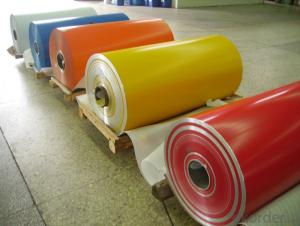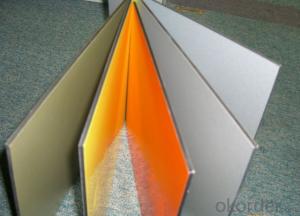Adp Aluminum Coil Cx360b635 Mill Finished Aluminum Sheets Foils Coils Circles
- Loading Port:
- Shanghai
- Payment Terms:
- TT or LC
- Min Order Qty:
- 5 m.t.
- Supply Capability:
- 9000 m.t./month
OKorder Service Pledge
OKorder Financial Service
You Might Also Like
Application: Foil stock, Circles, Roofing, Canstock, Marine plate,Anti-sliperypurpose in vehicles, packing and appliance.
Aluminium is a relatively soft, durable, lightweight, ductile and malleablemetal with appearance ranging from silvery to dull gray, depending on the surface roughness. It is nonmagnetic and does not easily ignite. A fresh film of aluminium serves as a good reflector (approximately 92%) of visible light and an excellent reflector (as much as 98%) of medium and far infrared radiation. The yield strength of pure aluminium is 7–11 MPa, while aluminium alloys have yield strengths ranging from 200 MPa to 600 MPa. Aluminium has about one-third the density and stiffness of steel. It is easily machined, cast, drawn and extruded.
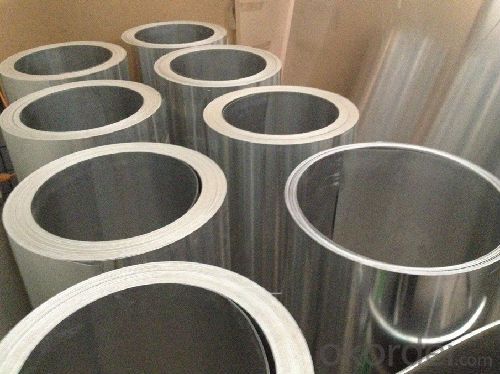
Alloy: AA1050, 1060, 1100, AA3003, 3005, 3015, 5052, 5754, 5083,8011,etc
Temper:H14/16/18/22/24/32,HO etc.
Thickness:0.2mm—100mm
Width:100mm—2300mm (Can be slitted)
Inner Diameter: 508MM
CoilWeight:500kg-3000kg(Max.)
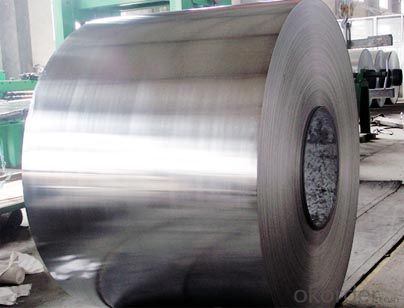
Surface Quality
1. There are no macular or roll marks on the surface of aluminum sheets.
2. There is no water corrosion on the surface.
3.The surface of aluminum sheets is very clean without lots of impurities.
An efficient quality control system is maintained and bears a documented quality assurance policy that is an approved quality assurance. It covers all our business activities like manufacturing, sales & service procedures. Under this system, we not only test the products but also check raw material.
Our quality assurance mechanism ensures that every product we manufacture passes through the following quality check stages:
Material control system
Process control system
Machining & dimensional control
Certification & supplementary test
Finishing & marking
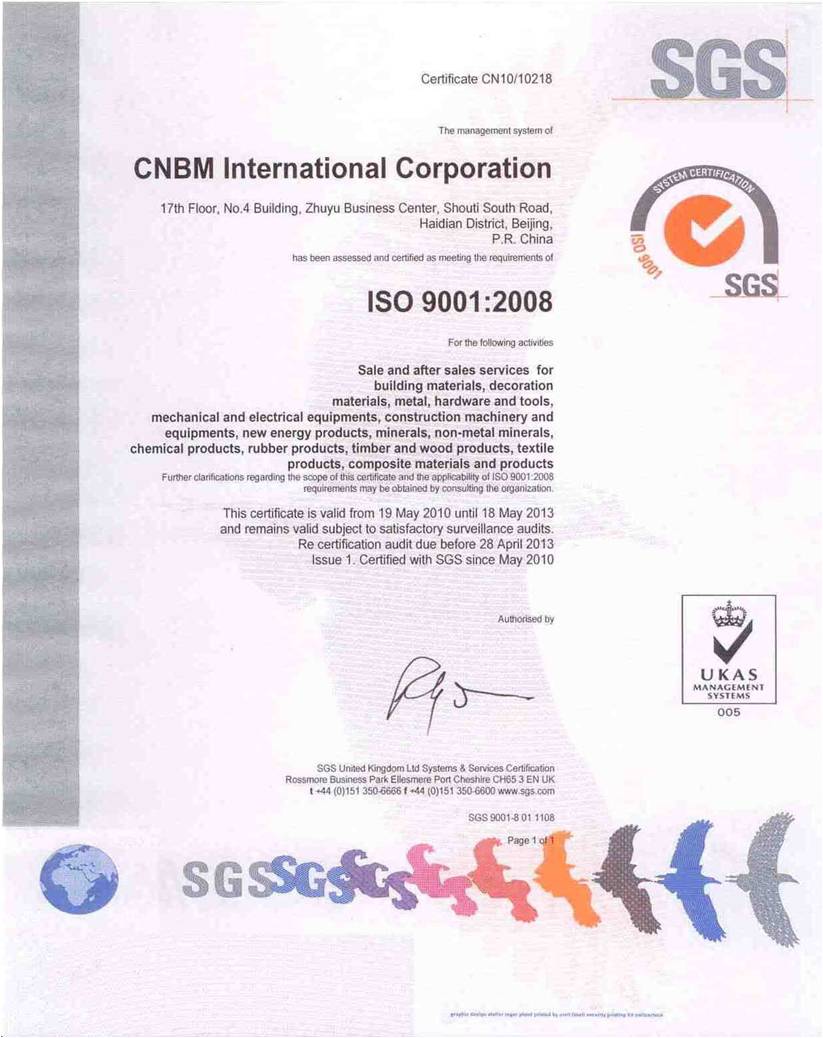
- Q: What are the main causes of aluminum strip rolling?
- Different thickness analysis is not the same, is curly after the thickness of the upper rib, or out of the roll can be visual?
- Q: This question asks for methods to determine the age of an aluminum coil, distinguishing between new and old.
- <p>To determine if an aluminum coil is new or old, you can look for several indicators: the surface condition, such as scratches or signs of wear; the quality of the protective coating, if any, which may degrade over time; the manufacturing date or batch number, if available; and the overall appearance and shine. New coils typically have a smooth, shiny surface with no significant scratches or dents, and a consistent protective coating. Old coils may show signs of oxidation, discoloration, or other forms of degradation. Additionally, testing the coil's physical properties, such as tensile strength, can provide clues about its age, as these properties can degrade over time.</p>
- Q: The user is asking if it's possible to use a punching machine to create holes in aluminum coils.
- <p>Yes, you can use a punching machine to punch holes in aluminum coils. Punching machines are designed to cut or create holes in various materials, including metals like aluminum. However, the type of punching machine and the specific settings will depend on the thickness and hardness of the aluminum coils. For thicker or harder aluminum, a more robust machine with appropriate dies may be necessary. Ensure that the machine is capable of handling the material's properties to avoid damage or inefficiencies in the punching process.</p>
- Q: How do aluminum coils contribute to sustainable energy systems?
- Aluminum coils play a crucial role in sustainable energy systems due to several reasons. Firstly, aluminum is a lightweight and highly conductive metal, making it an ideal material for the production of coils used in various renewable energy technologies such as wind turbines, solar panels, and electric vehicles. The lightweight nature of aluminum reduces the overall weight of these systems, thus increasing their efficiency and performance. Secondly, aluminum is abundant in nature and has a high recycling rate. It can be recycled repeatedly without losing its original properties, resulting in significant energy savings and reduced environmental impact. By using aluminum coils, sustainable energy systems can minimize their reliance on virgin materials and promote a circular economy. Furthermore, aluminum coils are corrosion-resistant and have excellent heat transfer properties. This makes them highly durable and capable of withstanding harsh weather conditions, ensuring the longevity and reliability of renewable energy systems. The durability of aluminum coils also reduces the need for frequent maintenance or replacements, thereby minimizing waste generation and conserving resources. Moreover, aluminum is a non-toxic material that poses minimal risks to human health and the environment. Unlike other metals, aluminum does not leach harmful substances into the soil or water, making it a safe choice for sustainable energy systems. Lastly, the use of aluminum coils in sustainable energy systems helps to reduce greenhouse gas emissions. As aluminum is lightweight, it requires less energy to transport and install, thereby reducing the carbon footprint associated with the manufacturing and installation processes. Additionally, the increased efficiency and performance of renewable energy systems using aluminum coils contribute to the displacement of fossil fuel-based energy generation, leading to a reduction in overall carbon emissions. In conclusion, aluminum coils contribute to sustainable energy systems by enhancing the efficiency, durability, recyclability, and environmental friendliness of renewable energy technologies. Their lightweight nature, corrosion resistance, and excellent heat transfer properties make them ideal for various applications, while their abundance and recyclability promote resource conservation and a circular economy. By using aluminum coils, sustainable energy systems can reduce their environmental impact, improve performance, and contribute to a cleaner and more sustainable future.
- Q: How are aluminum coils used in the production of HVAC components?
- The production of HVAC components relies heavily on the use of aluminum coils, which play a crucial role in the process. These coils are utilized in HVAC systems to facilitate heat transfer, contributing to both heating and cooling applications. In air conditioning units and heat pumps, aluminum coils are commonly employed within HVAC systems. They form an integral part of the refrigeration cycle, enabling the transfer of heat from one area to another. Acting as the key component in the heat exchanger, the coils are responsible for absorbing heat from indoor air during the cooling process, or releasing heat into indoor air during heating. The process commences with the circulation of refrigerant, a substance that passes through the coils, absorbing and releasing heat. When the HVAC system is in cooling mode, the aluminum coils function as an evaporator. Warm air from the indoor space passes over the coils, and the refrigerant within absorbs the heat, effectively cooling down the air. This cooled air is then circulated back into the room, providing a comfortable environment. Conversely, during heating mode, the aluminum coils operate as a condenser. The refrigerant, having absorbed heat from the external environment, flows through the coils. The cooler air from the indoor space moves over the coils, causing the refrigerant to release its heat. This heat is then distributed throughout the room, ensuring a warm and cozy atmosphere. The utilization of aluminum coils in HVAC systems offers numerous advantages. Aluminum is lightweight, enhancing the portability and ease of installation of HVAC units. Additionally, aluminum possesses excellent thermal conductivity, enabling efficient heat transfer. As a result, energy efficiency is improved, leading to reduced operating costs of the HVAC system. Furthermore, aluminum coils exhibit high resistance to corrosion, ensuring their durability and longevity. They can withstand harsh environmental conditions, including humidity and exposure to chemicals, without deteriorating. This makes aluminum coils a reliable and cost-effective choice for HVAC manufacturers. In conclusion, aluminum coils play an indispensable role in the production of HVAC systems, facilitating efficient cooling and heating functions through the process of heat transfer. Their lightweight nature, excellent thermal conductivity, and resistance to corrosion contribute to the overall performance, energy efficiency, and durability of HVAC units.
- Q: Are aluminum coils suitable for coil coating applications?
- Indeed, coil coating applications find aluminum coils to be a suitable option. Aluminum, owing to its outstanding resistance to corrosion, lightweight composition, and impressive strength-to-weight ratio, enjoys extensive usage in coil coating. Moreover, its high malleability facilitates effortless shaping and molding throughout the coil coating procedure. Furthermore, aluminum coils can be coated with an array of paints and coatings, offering a diverse selection of colors and finishes. To sum up, aluminum coils are a favored preference for coil coating applications due to their adaptability, longevity, and visually pleasing attributes.
- Q: What is the coefficient of thermal expansion of aluminum coils?
- The coefficient of thermal expansion of aluminum coils is typically around 23 x 10^-6 per degree Celsius.
- Q: wood aluminium windows?
- Vinyl looks MODERN and are in all the track homes. If you want you home to look cookie cutter choose the vinyl. If you have a nice home in an upscale neighborhood choose wood and any other other combo of wood and ?. If you are like the rest of us average shmos get the white vinyl
- Q: I am confused by that. One guy told me that he puts aluminium foil on his modem to receive the Internet better. Another guy told me that aluminium stops all kind of rays. What is correct?
- You can use aluminum foil to build a reflector to make a Wi-Fi router directional, and increase its range. You can also use it for electromagnetic shielding. Design matters.
- Q: What are the typical thickness tolerances for aluminum coils?
- The specific manufacturing standards and industry requirements play a role in determining the typical thickness tolerances of aluminum coils. Generally, the range of thickness tolerances for aluminum coils is between +/- 0.001 and 0.005 inches. These tolerances are crucial in maintaining the thickness of the aluminum coils within acceptable limits, ensuring they meet the desired specifications and applications. It should be emphasized that the intended use of the aluminum coils, whether for architectural, automotive, or aerospace purposes, may influence the specific tolerances.
Send your message to us
Adp Aluminum Coil Cx360b635 Mill Finished Aluminum Sheets Foils Coils Circles
- Loading Port:
- Shanghai
- Payment Terms:
- TT or LC
- Min Order Qty:
- 5 m.t.
- Supply Capability:
- 9000 m.t./month
OKorder Service Pledge
OKorder Financial Service
Similar products
Hot products
Hot Searches
Related keywords
